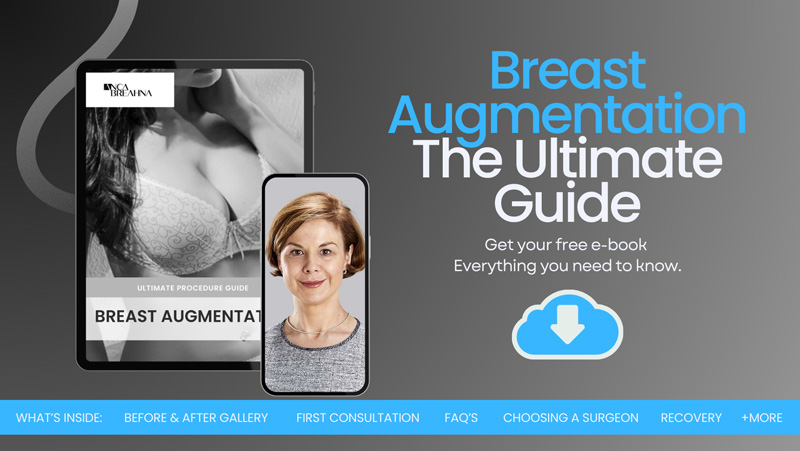
- Take our Plastic Surgery Quiz to find out if you'd be a good candidate for cosmetic surgery.
- Understanding the Importance of Routine Breast Implant Checks and Long-Term Monitoring
- Common Breast Implant Issues That May Arise Over Time
- Download Miss Anca Breahna's Breast Augmentation Guide
- Step-by-Step Guide: How to Perform a Thorough Breast Implant Self-Check at Home
- When to Seek a Professional Breast Implant Evaluation at Miss Anca Breahna’s Practice
- Breast Augmentation Before and After Photos
- The Role of Regular Professional Breast Implant Monitoring and Imaging
- Essential Tips for Maintaining Healthy and Long-Lasting Breast Implants
- FAQs About Breast Implant Checks
- Book a Comprehensive Breast Implant Check-Up with Miss Anca Breahna Today
- Further Reading
Breast implants can significantly enhance body confidence and self-image. However, ensuring their longevity and your health requires regular monitoring and breast implant checks. Whether you have recently undergone breast augmentation or have had implants for years, routine self-assessments are essential for early detection of potential concerns. Miss Anca Breahna, Consultant Plastic & Reconstructive Surgeon in Chester, UK, recommends regular self-checks to help maintain implant integrity and prevent complications. This guide will provide a detailed step-by-step approach to checking your breast implants and understanding when to seek professional consultation.
Take our Plastic Surgery Quiz to find out if you’d be a good candidate for cosmetic surgery.
Understanding the Importance of Routine Breast Implant Checks and Long-Term Monitoring
Breast implants are designed to be durable and long-lasting, but they are not lifetime devices. Over time, natural changes in your body and the implants themselves may affect their appearance and functionality. Miss Anca Breahna advises that regular implant monitoring can help detect potential concerns before they develop into more significant complications. Key reasons for performing regular self-examinations include:
- Early detection of implant complications such as rupture, leakage, or capsular contracture.
- Monitoring for aesthetic changes that may occur over time.
- Assessing implant positioning and stability to ensure optimal results.
- Recognising symptoms of potential issues before they require surgical intervention.
- Understanding the natural evolution of breast implants and ensuring their longevity.
By incorporating breast implant self-checks into your routine, you can take a proactive approach to maintaining both your aesthetic goals and overall well-being.
Common Breast Implant Issues That May Arise Over Time
Breast implants remain one of the most popular and safe cosmetic procedures, but it is crucial to be aware of potential concerns. Some of the most common implant-related issues include:
- Capsular Contracture: The hardening of scar tissue around the implant, causing discomfort and potential distortion.
- Implant Rupture or Leakage: Saline or silicone implants may develop small tears over time, leading to deflation (saline) or silent rupture (silicone).
- Implant Displacement or Rotation: A shift in implant positioning that can cause asymmetry or discomfort.
- Rippling or Wrinkling: Visible or palpable irregularities in the implant surface that can occur due to changes in body weight or implant positioning.
- Unexplained Swelling or Pain: Sudden changes in breast size or discomfort may indicate an underlying issue that requires professional assessment.
If you experience any of these concerns, Miss Anca Breahna recommends scheduling an appointment to discuss your symptoms and evaluate your implants through clinical examination and imaging.
Download Miss Anca Breahna’s Breast Augmentation Guide

Step-by-Step Guide: How to Perform a Thorough Breast Implant Self-Check at Home
- Visual Examination of Breast Shape, Symmetry, and Skin Condition
Begin by standing in front of a well-lit mirror and carefully observing your breasts from multiple angles. Check for:- Any visible changes in breast shape or symmetry.
- Unusual swelling or increased firmness in one or both breasts.
- Skin dimpling, redness, or changes in nipple positioning.
- Wrinkling, rippling, or an uneven surface over the implants.
Raise your arms above your head and observe how your breasts move. If you notice an abnormal shift in implant position or visible distortion, it may indicate a change in implant placement.
- Manual Palpation: Checking for Hardness, Lumps, or Unevenness
Using your fingertips, gently feel around the edges of the implants and across the entire breast area. Pay attention to:- Unusual firmness or areas of hardness, which may indicate capsular contracture.
- The presence of lumps or nodules.
- Differences between one breast and the other.
- Discomfort or pain when applying light pressure.
- Assessing Implant Movement and Positioning While Lying Down
Lie flat on your back and observe how your implants settle. If one implant appears to shift out of place or move significantly compared to the other, this could be a sign of displacement. Try gently pressing around the edges to ensure the implants remain in their expected position. - Monitoring Sensation and Comfort for Any Changes
Breast implants may cause minor sensation changes, but sudden numbness, tingling, or ongoing discomfort should not be ignored. Take note of any:- Sudden loss of sensation in the breast or nipple area.
- Increased tightness or pressure in one breast compared to the other.
- Burning sensations or unexplained aching.
If any of these symptoms persist, consult Miss Anca Breahna for a professional assessment.
When to Seek a Professional Breast Implant Evaluation at Miss Anca Breahna’s Practice
Not every change in your implants indicates a problem, but certain warning signs should prompt a professional evaluation with Miss Anca Breahna, Consultant Plastic & Reconstructive Surgeon in Chester, UK. If you experience any of the following, schedule a consultation promptly:
- Significant or persistent pain and discomfort.
- A noticeable shift in implant position, leading to asymmetry.
- Swelling, tightness, or an unexplained increase in breast size.
- Any concerns about implant rupture or leakage.
- Visible or palpable rippling, wrinkling, or hardness.
As a highly experienced Consultant Plastic & Reconstructive Surgeon, Miss Anca Breahna offers expert assessments using clinical examinations, imaging, and patient-focused care to determine the best course of action for your breast implants.
Breast Augmentation Before and After Photos
The Role of Regular Professional Breast Implant Monitoring and Imaging
Professional check-ups with an experienced surgeon like Miss Anca Breahna can ensure the long-term safety and stability of your implants. Depending on your implant type, she may recommend:
- Routine ultrasound or MRI scans every 5–6 years for silicone implants.
- Comprehensive physical examinations to assess implant positioning and health.
- Personalised advice on maintaining implant longevity based on your lifestyle and anatomy.
Regular professional assessments provide peace of mind and help detect potential issues early before they require more invasive correction.
Essential Tips for Maintaining Healthy and Long-Lasting Breast Implants
To keep your implants in the best possible condition, follow these long-term maintenance guidelines:
- Perform self-checks regularly to detect early signs of change.
- Schedule professional assessments with Miss Anca Breahna at recommended intervals.
- Wear well-fitted, supportive bras to reduce strain on implants.
- Avoid unnecessary trauma or high-impact activities that could affect implant positioning.
- Stay informed about breast implant health and updates from regulatory bodies like MHRA and BAAPS.
By following these steps, you can enjoy long-term confidence in your breast implants while ensuring their safety and durability.
FAQs About Breast Implant Checks
How often should I check my breast implants at home?
It is recommended to perform a breast implant self-check once a month to monitor for any changes or irregularities. This helps in early detection of any potential issues.
Can I detect a ruptured silicone implant through self-examination?
Silicone implant ruptures are often “silent” and may not cause obvious symptoms. Regular imaging, such as MRI or ultrasound, is advised every 5–6 years to ensure implant integrity.
What should I do if I notice a lump near my breast implant?
If you detect a lump, hardness, or unusual thickening around the implant, schedule an appointment with Miss Anca Breahna for a professional evaluation.
Is it normal for one breast to feel firmer than the other?
Some asymmetry is natural, but significant firmness in one breast could indicate capsular contracture or other implant-related issues. A professional assessment is recommended.
Will breast implant displacement cause pain?
Displacement may or may not cause discomfort, but if you notice a shift in implant position, asymmetry, or pain, consult Miss Anca Breahna for a thorough evaluation.
Can I check my breast implants after pregnancy or breastfeeding?
Yes, but hormonal changes can affect breast tissue, making self-examinations more challenging. A professional post-pregnancy breast evaluation can provide more clarity.
Do I need to replace my breast implants if they feel fine?
Breast implants do not have an expiration date, but they may need replacement after 10–15 years. Regular monitoring and surgeon consultations are key to determining if an update is necessary.
Medical References
- Breast Implants: Low Rate of Annual Check-Ups Results in Delayed Presentation of Ruptured Implants – J. Clin. Med. – https://www.mdpi.com/2077-0383/13/21/65451
- Breast Implant Safety – American Society of Plastic Surgeons – https://www.plasticsurgery.org/patient-safety/breast-implant-safety
- Imaging of Common Breast Implants and Implant-Related Complications – PMC – https://pmc.ncbi.nlm.nih.gov/articles/PMC4931781/
- A Guide to Breast Implants for the Non-Breast Specialist – PMC – https://pmc.ncbi.nlm.nih.gov/articles/PMC5373262/
- Risks and Complications of Breast Implants – FDA – https://www.fda.gov/medical-devices/breast-implants/risks-and-complications-breast-implants
- Breast Augmentation – Mayo Clinic – https://www.mayoclinic.org/tests-procedures/breast-augmentation/about/pac-203931786
- Breast Implant Illness in Women with Implant-Based Reconstruction – European Journal of Public Health – https://academic.oup.com/eurpub/article/34/Supplement_3/ckae144.1457/78450787
Book a Comprehensive Breast Implant Check-Up with Miss Anca Breahna Today
If you have concerns about your breast implants or it is time for a routine check-up, book a consultation with Miss Anca Breahna in Chester, UK. As a leading Consultant Plastic & Reconstructive Surgeon, she provides expert evaluations and tailored guidance to help you maintain healthy, beautiful results.
Contact our practice today to schedule your breast implant check and ensure your peace of mind.
Further Reading
- Read more about Breast Implant Removal (without Replacement or Uplift)
- Read more about Breast Implant Choices
- Read more about How Long Do Breast Implants Last?
- Read more about How Can You Tell if You Have a Ruptured Breast Implant?
- Read more about Signs It’s Time to Replace Your Breast Implants
Back to blog



 Ms Anca Breahna, PhD, MSc, FEBOPRAS, FRCS (Plast) is a highly regarded Consultant Plastic Surgeon specialising in the field of Aesthetic and Reconstructive Plastic Surgery. Anca performs a range of
Ms Anca Breahna, PhD, MSc, FEBOPRAS, FRCS (Plast) is a highly regarded Consultant Plastic Surgeon specialising in the field of Aesthetic and Reconstructive Plastic Surgery. Anca performs a range of 